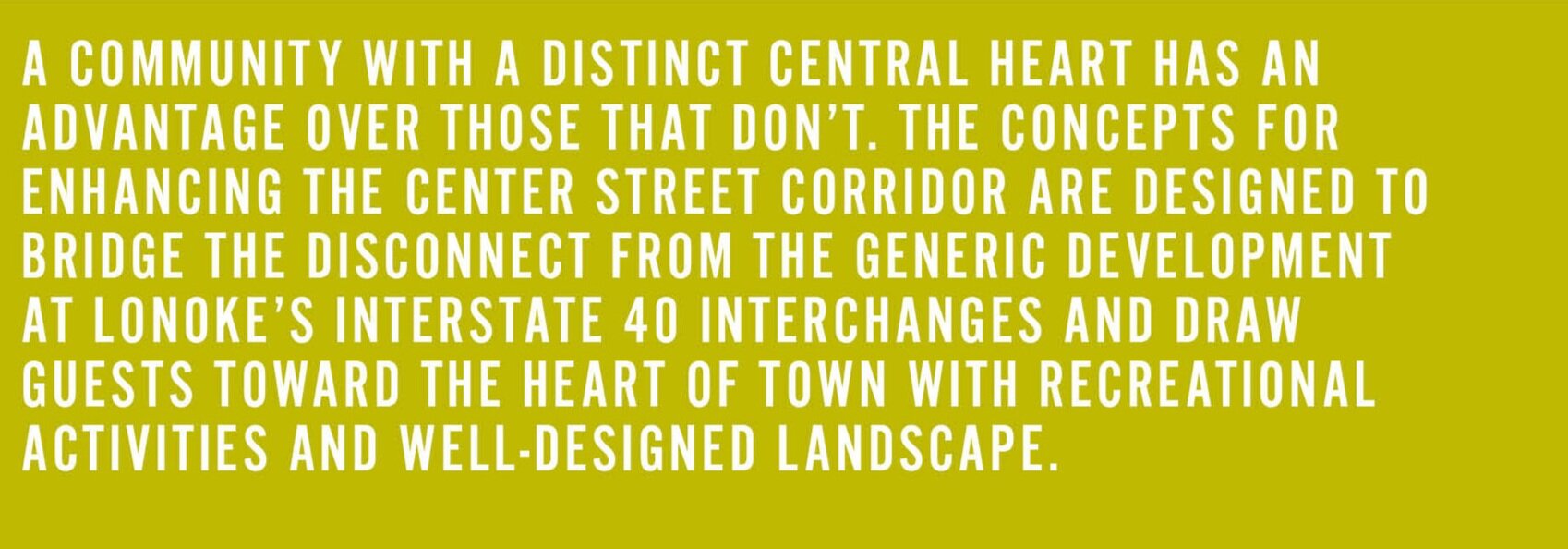How to move a small town forward.
By Ryan Biles
CONNECTING LONOKE: Trails and greenspace are part of the vision.
A typical morning in the town of Lonoke begins with the sunrise over a rice field, fish transport trucks rumbling to life to begin cross-country delivery routes from one of the community’s innumerable minnow or goldfish ponds, and public servants and attorneys heading to work in the 1928 County Courthouse on the edge of downtown. For many years, Lonoke has been overlooked, taking a back seat in size and visibility to other communities that have been impacted by the suburban population shift in the last three decades.
Four years ago, citizen volunteers in Lonoke decided to identify resources and partners to develop a plan of action. Like numerous communities concerned with creating opportunity for students — the objectives of battling rural “brain drain”— reversing population stagnation and stimulating job growth was central to their motivation. Determined that their hometown had potential that had not yet been cultivated into opportunity, Lonoke’s volunteers worked with the University of Central Arkansas’s Center for Community and Economic Development to develop a strategic plan, unveiled in May 2017. This planning process emphasized an asset-based approach to prioritizing and undertaking key projects. Following this “Ideas Phase,” volunteers formed action teams and launched “Lonoke 2022,” a five-year implementation phase to conclude with the town’s 150th anniversary. At the heart of this volunteer effort is the common vision to build a “Visible, Attractive, and Connected Lonoke.” That vision statement has been a constant guide as the community of Lonoke began to “make the bricks” that would be used to construct the future they had declared for themselves.
Lonoke Mayor Trae Reed, who has a degree in landscape architecture, was determined to amplify the voices of volunteers and citizens who have been pushing for a fresh approach in the community. With a designer’s eye, he understood that well-planned public spaces provide opportunities for shared experiences and inclusion. Before taking office, Reed and his family launched Fishtown Farmers Market — a first for the town — in downtown Lonoke, where they experienced firsthand the power of activating a previously ignored outdoor space. In the years since the birth of the Farmers Market, citizens have seen how such pedestrian-friendly development — as opposed to “design by default” — can invigorate communities.
In 2019, Reed invited colleagues and mentors Professors Peter Summerlin and Jason Walker from Mississippi State University, where Reed received his bachelor’s degree, to consider the town of Lonoke as the subject of their studies in the university’s fall 2019 Regional Design Studio. A student-driven, three-part process resulted in the “Connecting Lonoke” presentation, which created vignettes for pilot projects focusing on Two Prairie Bayou, state Highway 31 corridor enhancements, downtown Lonoke public space, Lonoke Community Center expansion and outdoor recreation, Lonoke Ballpark enhancements and a greenway recreational network. The concepts developed in the “Connecting Lonoke” study have sparked imagination both within and outside the community. Locals have recently tested the waters of Two Prairie Bayou on the north edge of town with a kayak and canoe float with the goal of developing a water trail, wetland arboretum and education center, an asset for both citizens and travelers. The greenway recreation trail concept is designed to create a hub of activity for a regional trail system along former railroad tracks to connect Lonoke with North Little Rock, the Clinton Presidential Center, the Arkansas River Trail and beyond. Lonoke has re-engaged with Metroplan to investigate the funding of recreational and transportation infrastructure projects to enhance connectivity and create destinations with Lonoke.
A community with a distinct central heart has an advantage over those that don’t. The concepts for enhancing the Center Street corridor are designed to bridge the disconnect from the generic development at Lonoke’s Interstate 40 interchanges and draw guests toward the heart of town with recreational activities and well-designed landscape. Shared spaces provide common ground for exchanging friendly waves, compelling ideas, personal concerns and warm smiles. Downtown Lonoke, long anchored by the historic Rock Island Depot, which was saved through the historic preservation efforts of past generations, represents a blank canvas that neighbors can fill.
Recreational trails now occupy the former railroad right-of-way, and new businesses are bringing experiences that the town has not previously known. The Cozy Nook Studio and Gallery brings fine art and art education to the heart of Lonoke. An adaptive reuse project to develop a new local restaurant called The Grumpy Rabbit promises a refreshing, well-designed experience housed in a historic building in Downtown Lonoke. The “Connecting Lonoke” plan contains concepts for a downtown plaza and open structures for gathering and a permanent home for the community’s farmers market. Lonoke will soon have a downtown coffee shop again. A walk audit has been conducted via a partnership with the University of Arkansas for Medical Sciences and UCA in advance of the development of a bike and pedestrian master plan for the town. In May 2020, Lonoke learned that it was accepted into Main Street Arkansas’s Downtown Network program. The goals of the 2017 Strategic Action Plan are being achieved one by one.
Lonoke is now in a position to define its growth on its own terms. As a community in which the pace of life is noticeably slower than many of the suburban communities circling Little Rock, Lonoke is leveraging the unique asset of a different pace to plan and implement with intention. In a place where most progress will be incremental, Lonoke’s volunteers and elected leaders have embraced a posture of intentionality and strategic planning. In a small community, every incremental win can be leveraged for the next step toward progress.
Ryan Biles is an architect, the director of development for Thrive Inc., a Lonoke alderman and a member of Lonoke 2022.




